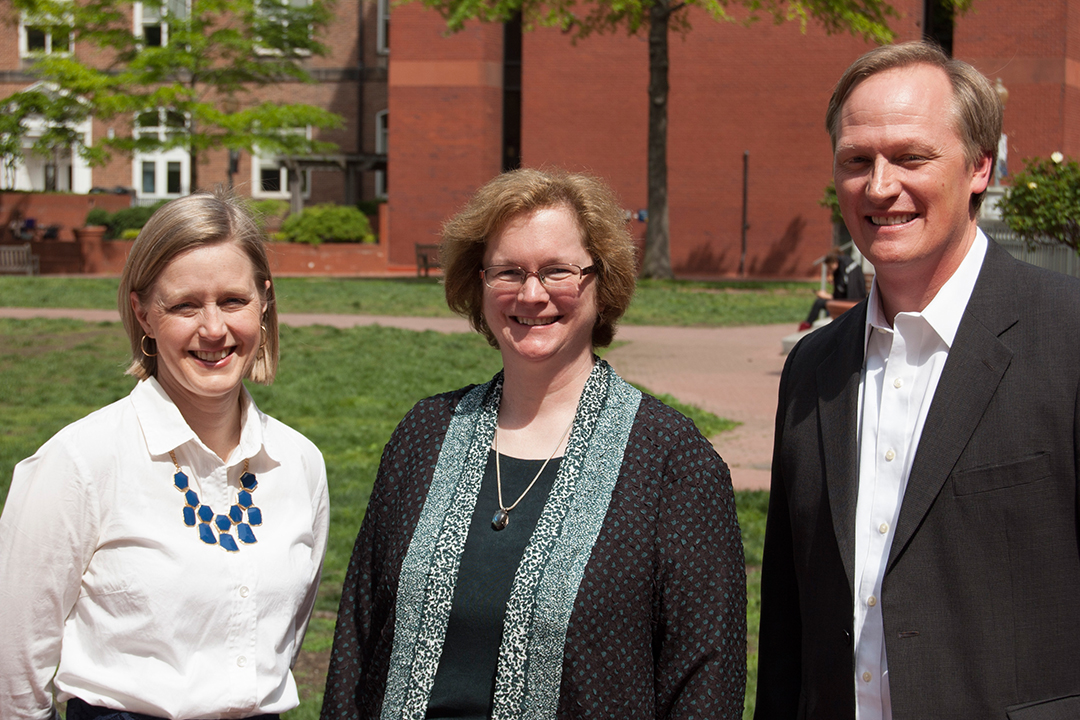By John DiConsiglio
In her research and scholarly career, Associate Professor of Chemistry Cindy Dowd has won prestigious awards, secured landmark grants and advanced the battle to cure diseases like tuberculosis and malaria. But she’s the first to concede that she hasn’t climbed any of those heights alone. From the teachers who nurtured her early interest in science to the colleagues who guided her through the intricacies of the laboratory and the classroom, Dowd said her success has been built on the shoulders of her mentors. And she is determined to return the favor.
“We have each benefitted from good mentorship over the years, and it is incumbent upon us, then, to pay back the system and nurture those following in our footsteps,” Dowd said. “We are all on the same team.”
Whether she is acting as a sounding board for ideas, reviewing colleagues’ grant proposals or offering advice on lab management strategies, Dowd sees mentoring as an integral component of her role as a teacher and scientist. She’s not alone. Denver Brunsman, associate professor of history, has advised colleagues from different disciplines on their research and funding pursuits. And Shelley Brundage, associate professor in the Department of Speech, Language and Hearing Sciences, has enjoyed a “pay-it-forward” cycle, seeing colleagues she has mentored go on to become dedicated mentors themselves.
“Mentoring is an altruistic endeavor. It makes me feel good when my mentees succeed,” Brundage said. “Celebrating their achievements contributes positively to our departmental ethos and helps new faculty members see themselves as valuable members of the department.”
For stewarding ideas and fostering the development of young faculty, Dowd, Brunsman and Brundage were recently recognized with Columbian College’s inaugural Dean’s Research Excellence Award for Mentoring (DREAM), a new effort to promote research mentoring. The three professors each received a $1,000 honorarium.
“The DREAM award allows us to recognize the hard work of our mentors as unsung heroes behind our successful faculty researchers, and create a culture for research mentoring for our faculty, especially our junior faculty,” said Yongwu Rong, Columbian College’s associate dean for research & strategic initiatives.
Stepping Up and Being There
Each of the three DREAM winners was acknowledged for actively engaging junior faculty and helping them navigate research challenges—whether that means offering advice and constructive criticism on proposals and lab management or regularly meeting over coffee to brainstorm initiatives and lend a sympathetic ear.
“Dr. Dowd is a passionate and natural-born mentor,” said Assistant Professor of Chemistry Peter Nemes. Dowd has served as Nemes’ faculty mentor since he came to GW in 2013. He credits her with helping him better understand and craft effective grant proposals while communicating his research goals to a variety of audiences from donors to students. “Her candor and direct-styled communication has challenged me to continuously self-reflect and develop as a researcher and educator.”
Brunsman, who called mentoring “a special activity because it combines elements of research, teaching and service,” has aided colleagues across different disciplines. The recipient of numerous grants from the National Endowment for the Humanities (NEH), Brunsman worked closely with Antonio López, associate professor of English, and Cory Jorgenson, assistant professor of Arabic, on their own NEH funding proposals. As an expert on early American history and the life of George Washington, Brunsman mentored Assistant Professor of English Daniel DeWispelare for a project interpreting runaway slave advertisements purchased by the first president. Brunsman was able to help his colleague collaborate with researchers at the Mount Vernon estate. “Denver has always been available to discuss research and teaching and, of course, he is a great person to go to with historical or bibliography questions,” DeWispelare said.
Brundage, who pioneered the use of virtual reality technologies in the treatment of stuttering, has mentored Adrienne Hancock, associate professor in the Speech, Language and Hearing Department, since 2005. Brundage beamed with pride as she lauded Hancock for her own mentoring activities, helping graduate students through research projects and master’s theses. “It really kind of brings our relationship full circle,” she said. “Now my mentee is a recognized mentor herself!”
All three DREAM winners described mentoring as a balancing act between creating a trusting space to share ideas and advice while pushing back with honest critiques. “You have to apply constructive criticism in a positive and friendly way,” Dowd said.
The mentors must be willing to learn as much as teach, Brunsman noted, particularly when reaching across disciplines. “I approach mentoring with a great deal of humility. In most cases, the mentee will know more about a particular subject than the mentor.” Much of the mentoring process, Brundage maintained, is carving out time in over-crowded schedules to meet with colleagues and attend to their concerns. “I try my best to be available when mentees need their questions answered. Sometimes mentoring is ‘tactical’ and ‘in the moment,’ whereas at other times it’s more systematic and scheduled,” she said. Either way, she said, half the job is simply being there.


